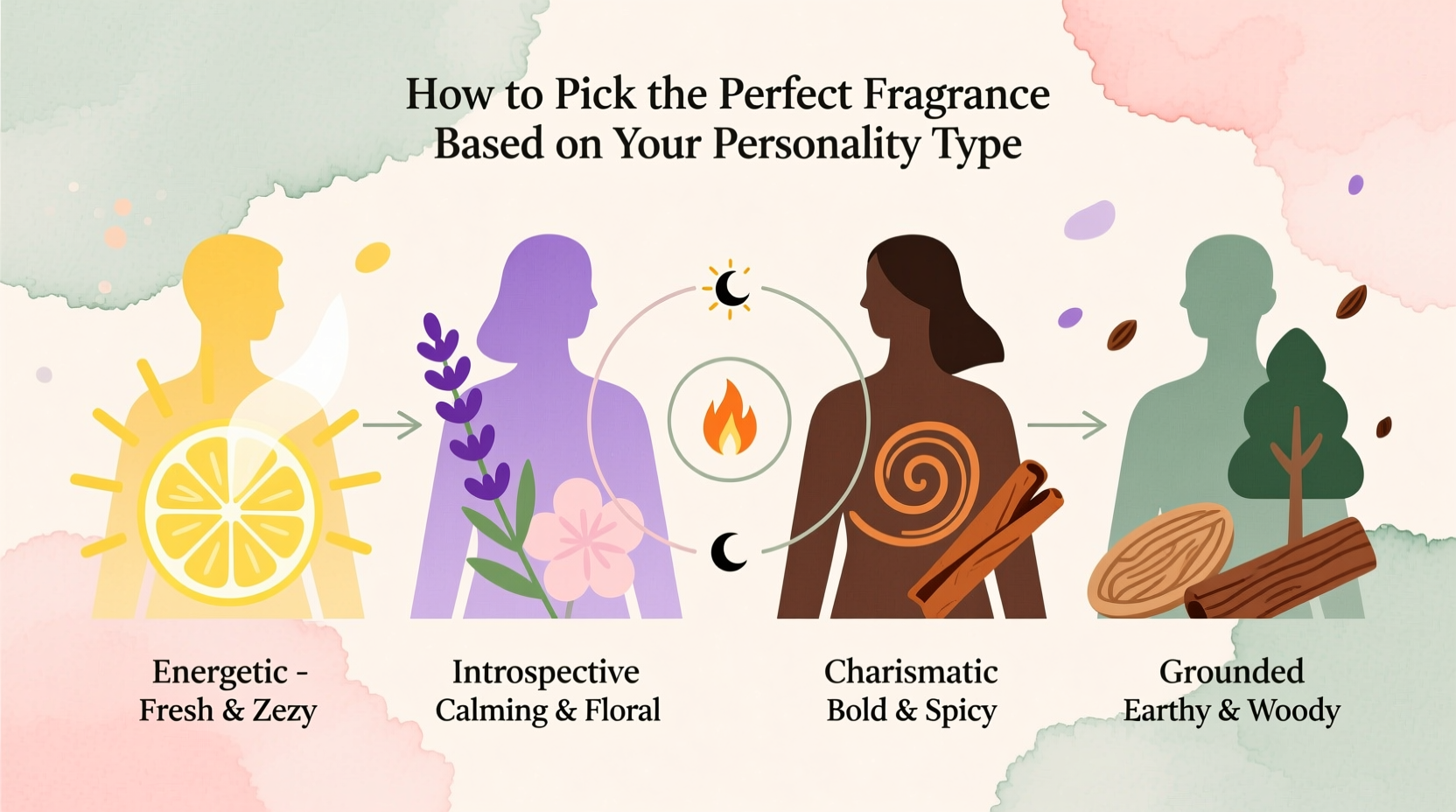Fragrance is more than a sensory pleasure—it’s an extension of identity. The scent you wear lingers long after you’ve left a room, shaping impressions and evoking emotions. Yet, most people choose perfumes based on trends, packaging, or fleeting attraction rather than alignment with their inner selves. Selecting a fragrance that mirrors your personality isn’t just poetic; it’s practical. When your scent resonates with your temperament, it enhances confidence, comfort, and authenticity.
This guide explores how to decode your personality traits and match them to olfactory families—from bold ambers to delicate florals—so you can wear a scent that feels like *you*, not someone else’s idea of you.
Understanding Scent Psychology: Why Personality Matters

The connection between personality and scent preference is backed by psychological research. A 2017 study published in *Chemosensory Perception* found that individuals with higher openness to experience tend to prefer complex, spicy fragrances, while conscientious types lean toward clean, fresh notes. Extraverts often gravitate toward bold, sweet, or musky scents, whereas introverts may favor subtle, woody, or green accords.
Scent activates the limbic system—the brain’s emotional center—before we even consciously recognize a smell. This means your fragrance doesn’t just influence how others perceive you; it shapes your mood, self-image, and behavior. Wearing a scent that contradicts your nature—like an earthy sandalwood on a bubbly extrovert—can create internal dissonance, making you feel “off.”
By aligning your fragrance with your personality, you create harmony between your inner world and outer expression.
The Five Major Personality Archetypes & Their Fragrance Matches
Using insights from the Big Five personality model (openness, conscientiousness, extraversion, agreeableness, neuroticism), we can categorize scent preferences into five intuitive archetypes. These aren’t rigid boxes but fluid guides to help you explore what resonates.
| Personality Type | Core Traits | Fragrance Family | Signature Notes | Example Scents |
|---|---|---|---|---|
| The Free Spirit | Imaginative, curious, loves novelty | Oriental, Gourmand, Fougère | Vanilla, saffron, patchouli, tobacco | Tom Ford Black Orchid, Maison Margiela By the Fireplace |
| The Classicist | Organized, reliable, values tradition | Chypre, Aldehydic, Floral Aldehyde | Bergamot, oakmoss, rose, powdery musk | Chanel No. 5, Guerlain L’Heure Bleue |
| The Energizer | Outgoing, dynamic, thrives on attention | Floral, Fruity, Aquatic | Peach, jasmine, sea breeze, mandarin | Juicy Couture Viva La Juicy, D&G Light Blue |
| The Grounded Soul | Calm, empathetic, deeply intuitive | Woody, Earthy, Green | Sandalwood, vetiver, moss, fig | Diptyque Philosykos, Le Labo Santal 33 |
| The Intense Thinker | Reflective, sensitive, emotionally deep | Amber, Leather, Smoky | Leather, incense, labdanum, smoked woods | Amouage Interlude Man, Initio Parfums Privés Oud for Greatness |
Step-by-Step Guide: Find Your Scent-Personality Match
Selecting a fragrance based on personality isn’t about fitting a mold—it’s about exploration and resonance. Follow this five-step process to uncover your ideal scent profile.
- Assess Your Core Traits
Reflect honestly: Are you drawn to adventure or routine? Do you seek calm or stimulation? Journal three adjectives that describe your essence (e.g., warm, meticulous, spontaneous). - Identify Your Mood Triggers
Note which scents make you feel confident, relaxed, or energized. Did a grandmother’s lavender sachet bring comfort? Does rain on concrete stir something deep? These memories signal olfactory affinities. - Map Your Lifestyle
Consider your daily environment. Office workers may need subtlety; creatives might embrace bold statements. A high-energy social life calls for projection; quiet routines suit intimate skin scents. - Test Strategically
Visit boutiques during low-traffic hours. Spray no more than two scents per visit. Apply to skin, not paper—your chemistry alters the fragrance. Wait 20–30 minutes to assess dry-down. - Live With It Before Committing
Borrow samples or travel sizes. Wear the scent across different days and settings. Ask trusted friends for feedback: “How do I come across when wearing this?”
Expert Insight: The Perfumer’s Perspective
Fragrance creation is as much psychology as chemistry. We spoke with Clara Duport, a Paris-based perfumer with over 15 years of experience crafting niche scents.
“People don’t buy perfume for its ingredients—they buy the person they want to become. A shy client once chose a powerful oud because she wanted to feel ‘unignorable.’ But after weeks, she returned saying it felt like a costume. We reformulated with amber and soft leather—still strong, but grounded. That became her signature. The right scent should feel like a second skin, not a mask.” — Clara Duport, Master Perfumer
Duport emphasizes that longevity and sillage (scent trail) matter less than emotional congruence. “If a fragrance makes you check your reflection more, wondering if it’s really you—then it’s not the one.”
Real Example: From Mismatch to Signature Scent
Meet Daniel, a 34-year-old librarian with a love for poetry and early morning walks in the woods. He initially wore a popular aquatic cologne marketed to “confident men.” Colleagues called him “crisp” and “professional,” but Daniel felt disconnected. “It smelled like a hotel lobby,” he said. “Clean, but impersonal.”
After taking a scent personality quiz and consulting a boutique specialist, he tried Diptyque Tam Dao—a creamy sandalwood with hints of cypress and spice. The first time he wore it, a patron commented, “You always seem so peaceful. Today, you smell like it too.” That moment confirmed the shift: his scent now mirrored his inner calm. Two years later, he owns three bottles and gifts mini versions to friends seeking tranquility.
Avoiding Common Fragrance-Personality Pitfalls
Even with good intentions, mismatches happen. Here are frequent missteps and how to avoid them:
- Choosing Based on Gender Norms: Floral scents aren’t “feminine,” nor are woods exclusively “masculine.” A sensitive man may thrive in rose; a bold woman might own leather with authority.
- Overvaluing First Impressions: Top notes fade within 15 minutes. Many reject a fragrance too soon, missing its heart and base evolution.
- Ignoring Skin Chemistry: Vanilla can turn sour on some; citrus may vanish quickly on dry skin. Always test on your own body.
- Following Celebrity Trends Blindly: A scent loved by a charismatic star may overwhelm a reserved personality. Let admiration inspire, not dictate.
Checklist: Is This Fragrance Truly You?
Before purchasing, ask yourself these questions:
- ✅ Do I reach for the bottle instinctively, or only on special occasions?
- ✅ Does it make me stand taller or pause to inhale my wrist?
- ✅ Have others noticed a positive change in my presence since wearing it?
- ✅ Does it feel consistent across seasons and moods?
- ✅ If I close my eyes, does the scent evoke a place or feeling that feels like home?
If you answer “yes” to most, you’ve likely found your match.
Frequently Asked Questions
Can my fragrance preference change as I age or evolve?
Absolutely. Personality shifts through life stages—career changes, relationships, personal growth. A college student drawn to sugary gourmands may later embrace smoky ambers as they gain depth and introspection. Reassess your scent every few years. Evolution is natural.
What if I have multiple personality traits? Can I wear more than one fragrance?
Yes—and many do. Consider having a “day” and “evening” scent, or seasonal rotations. A vibrant fruity floral for summer socials, a deep resinous blend for winter reflection. Just ensure each aligns with the version of you present in that context.
How do I know if a scent is too strong for my personality type?
If people comment on your fragrance before anything else—if doors seem to close faster behind you—it’s likely overpowering. Subtle personalities should avoid heavy sillage. Apply to pulse points only, and consider Eau de Toilette over Parfum concentration.
Final Thoughts: Wear Your Truth
Perfume is invisible clothing. It dresses your presence before words are spoken. In a world of noise and performance, choosing a fragrance rooted in personality is an act of quiet authenticity. It says: *This is me, not what I think you want me to be.*
You don’t need the most expensive bottle or the trendiest name. You need the scent that makes you nod slightly when you catch a whisper of it on your collar—the one that feels like recognition.









 浙公网安备
33010002000092号
浙公网安备
33010002000092号 浙B2-20120091-4
浙B2-20120091-4
Comments
No comments yet. Why don't you start the discussion?